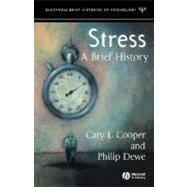
Philip Dewe is Professor of Organizational Behaviour and Head of the Organizational Psychology Department at Birkbeck College. He is the author of numerous books and articles, including Organizational Stress (with Cary L. Cooper and Michael P. O’Driscoll, 2001) and Coping, Health and Organisations (edited with Tom Cox and Michael Leiter, 2000).
| Acknowledgments | x | ||||
| CHAPTER 1 FROM EARLY BEGINNINGS TO THE TWENTIETH CENTURY | 1 | (8) | |||
|
1 | (2) | |||
|
3 | (1) | |||
|
4 | (3) | |||
|
7 | (2) | |||
| CHAPTER 2 THE TWENTIETH CENTURY: THE EARLY YEARS | 9 | (30) | |||
|
9 | (1) | |||
|
10 | (1) | |||
|
11 | (2) | |||
|
13 | (7) | |||
|
20 | (13) | |||
|
33 | (3) | |||
|
36 | (3) | |||
| CHAPTER 3 THE TWENTIETH CENTURY: FROM THE 1950's TO RICHARD LAZARUS | 39 | (28) | |||
|
39 | (2) | |||
|
41 | (2) | |||
|
43 | (3) | |||
|
46 | (1) | |||
|
47 | (4) | |||
|
51 | (4) | |||
|
55 | (2) | |||
|
57 | (3) | |||
|
60 | (2) | |||
|
62 | (3) | |||
|
65 | (2) | |||
| CHAPTER 4 THE WORK OF RICHARD LAZARUS | 67 | (18) | |||
|
67 | (1) | |||
|
68 | (1) | |||
|
69 | (2) | |||
|
71 | (3) | |||
|
74 | (4) | |||
|
78 | (1) | |||
|
79 | (3) | |||
|
82 | (1) | |||
|
83 | (2) | |||
| CHAPTER 5 WORK STRESS AND OCCUPATIONAL HEALTH PSYCHOLOGY | 85 | (25) | |||
|
85 | (1) | |||
|
85 | (2) | |||
|
87 | (3) | |||
|
90 | (2) | |||
|
92 | (2) | |||
|
94 | (4) | |||
|
98 | (4) | |||
|
102 | (5) | |||
|
107 | (1) | |||
|
108 | (1) | |||
|
109 | (1) | |||
| CHAPTER 6 WHAT DO WE MEAN BY STRESS: FROM THE PAST TO THE FUTURE | 110 | (10) | |||
|
110 | (1) | |||
|
110 | (3) | |||
|
113 | (1) | |||
|
114 | (1) | |||
|
115 | (1) | |||
|
116 | (1) | |||
|
117 | (1) | |||
|
118 | (2) | |||
| References | 120 | (17) | |||
| Index | 137 |
The New copy of this book will include any supplemental materials advertised. Please check the title of the book to determine if it should include any access cards, study guides, lab manuals, CDs, etc.
The Used, Rental and eBook copies of this book are not guaranteed to include any supplemental materials. Typically, only the book itself is included. This is true even if the title states it includes any access cards, study guides, lab manuals, CDs, etc.